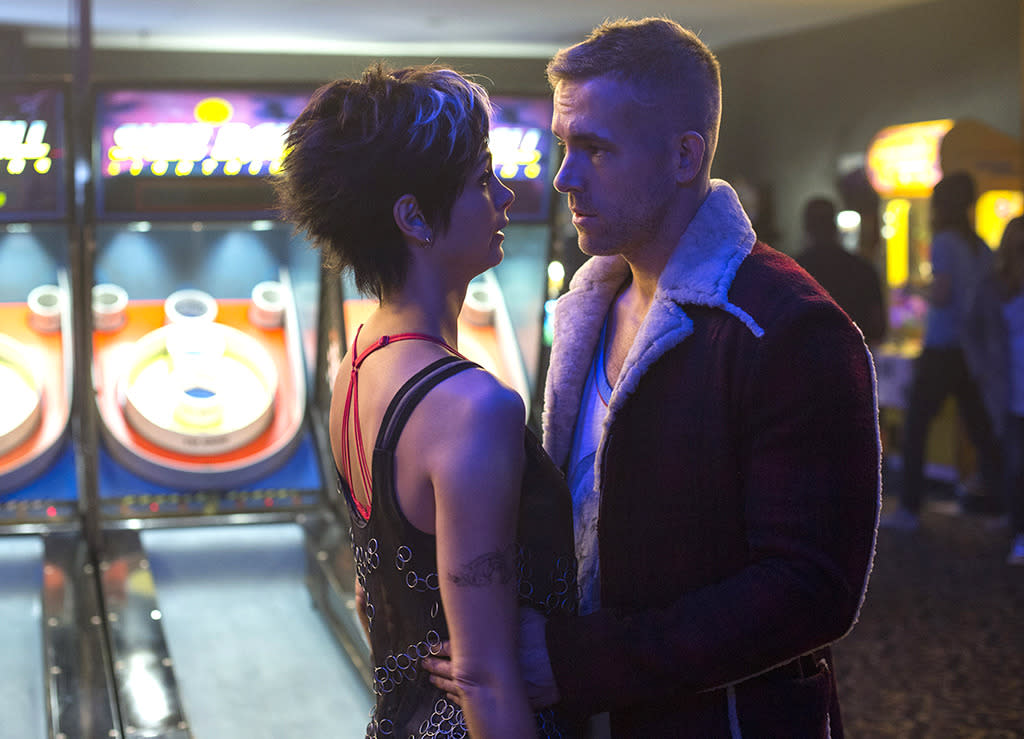The 'Deadpool Effect' Should Be About Chasing Originality, Not Raunchiness, Says Crew Behind 'Deadpool'

Morena Baccarin and Ryan Reynolds in ‘Deadpool’ (Twentieth Century Fox)
After the R-rated superhero actioner Deadpool defied precedent, exceeded expectations, and opened to the Salt-N-Pepa-crooned tune of $138 million at the box office (on its way to a cool $358 million total in the U.S. and $756 million worldwide and still counting), the rest of Hollywood took notice.
Soon there were reports that Deadpool’s old X-Men buddy Wolverine could follow suit with an R rating on his upcoming standalone 2017 sequel, and Warner Bros. announced that Batman v Superman would unveil its own R-rated cut on that film’s Blu-ray release, if not in theaters. The reaction was quickly dubbed “The Deadpool Effect.”
Related: ‘Deadpool’ Opening Credits: Hints for an Easter Egg Hunt
The folks behind Deadpool, though, aren’t exactly enthused by the so-called effect’s implications: that the film industry will now actively attempt to crank out more hyper-violent, sex-filled superhero adventures.
“I think it’s missing the point,” said Deadpool co-writer Rhett Reese at an event promoting the film’s upcoming Blu-ray release. “If you’re going to attribute Deadpool’s success to anything it’s that we weren’t looking to any prior project to validate what we were doing, or to follow in anyone’s footsteps. We were just churning our own path.”
Reese’s partner-in-scribe Paul Wernick said he’s heard that people within the industry want to “Deadpool it out” in regard to upcoming projects. “And I feel like that’s a recipe for disaster.” Reese echoed that sentiment. “Kiss of death,” he added.
Related: ‘It Sucks to Be Naked All the Time’: On the set of ‘Deadpool’
“I think it’s terrible, and awesome, at the same time,” director Tim Miller said. Awesome, ostensibly because it’s Miller’s directorial debut that’s being widely recognized as a game-changer. Terrible, because of how it potentially could be mishandled. “Trends in movies start because somebody does something different and then other people try to do the same thing, and it’s not the same thing because it’s not original and fresh anymore,” said Deadpool producer Simon Kinberg, who also oversees the X-Men properties for Fox.
It was Guardians of the Galaxy director James Gunn who first raised concerns about Hollywood’s knee-jerk reaction to Deadpool’s huge opening. “You’ll see Hollywood misunderstanding the lesson they should be learning with Deadpool,” he wrote on Facebook. “They’ll be green lighting films ‘like Deadpool’ — but, by that, they won’t mean 'good and original’ but 'a raunchy superhero film’ or 'it breaks the fourth wall.’”
Related: ‘Guardians of the Galaxy’ Director Predicts Studios Will Miss the Point of ‘Deadpool’ Success
The Deadpool crew couldn’t agree more. “I thought it was brilliant,” Miller said of Gunn’s response. “Some people referenced it to me like, 'You must be so annoyed with that.’ I’m like, 'What, he’s right! He’s absolutely right… [Deadpool] is its own thing. There are other movies that could be like it, other characters that could play in that world. But you can’t make Batman and Superman like Deadpool. It would be untrue to their characters, which is fundamentally the thing that we did, which was stayed true to the character.”
The latest film to conjure up mentions of Deadpool’s record-breaking success is August’s DC Comics release, Suicide Squad. “The 'Deadpool Effect’ Is Costing 'Suicide Squad’ Millions in Reshoots,” read one recent headline when reports surfaced that Warner Bros. was funding additional production on the project to infuse more humor in it (a charge its director David Ayer has called “silly”).
“I seriously doubt that Suicide Squad is reshooting anything because Deadpool had a lot of jokes in it,” Miller said. “I think they’re probably making their movie the best it could be. It had nothing f–king to do with Deadpool.”
Related: Everything You Need to Know About That ‘Deadpool’ End-Credits Scene
Despite their trepidation, the Deadpool crew is hopeful that Hollywood can still take other lessons from their success. As Reese said, “I would hope that the Deadpool Effect would be merely to get people more excited about following original voices and going down original paths, as opposed to trying to figure what about our movie succeeded so then they could then apply it to theirs.”
Kinberg remembers growing up on R-rated blockbusters that didn’t come from comic books, like the Terminator, Die Hard, and Lethal Weapon movies — originals that might not even be greenlit today. "I think it’d be cool to see more variety in big blockbuster movies — not just comic-book movies but blockbuster movies in general,“ he said. "It would be fun to see movies have the freedom to be R-rated and have the big action and effects and all that. So maybe that will be The Deadpool Effect.”
Deadpool hits DVD and Blu-ray on May 10.
James Gunn’s viral ‘Deadpool Effect’ comments examined:


